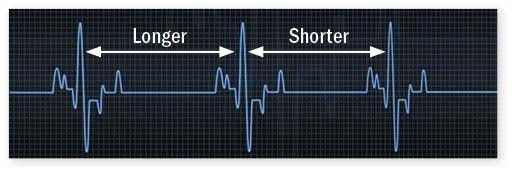How relevant is heart rate variability?
Ask the doctor

Q. I’ve been hearing more about heart rate variability lately. What is it exactly? Should I be tracking mine?
A. My patients have also been asking me about heart rate variability (HRV), which is yet another metric people can track on a smart watch beyond those I mentioned in my June Q&A (see “Smart watch alerts about heart health” in the June 2025 Heart Letter).
HRV is a measure of the tiny fluctuations in timing from one beat of your heart to the next. These differences are so brief (lasting just milliseconds) that they’re undetectable except with specialized devices. Because a steady, regular pulse is a sign of a healthy heart, you might assume that having very little variation between beats (a low HRV) is best. In fact, a high HRV is linked to better cardiac health, which suggests that it shows your heart is subtly yet rapidly adapting to changes happening throughout your body.
Although gleaned from your heart’s activity, HRV is actually a reflection of your autonomic nervous system. This system, which runs on autopilot and regulates involuntary actions like heart rate, breathing, and digestion, features two opposing parts. One, the sympathetic nervous system, governs the stress (fight-or-flight) response. The other, the parasympathetic nervous system, controls the relaxation (rest-and-recovery) response. The constant push-pull between these two systems underlies the variability in your heart rate.
Most smart watches measure your HRV automatically while you’re sleeping, either continuously or briefly at specific intervals. Some also check periodically throughout the day or on demand. Overnight checks are thought to provide a better representation of your autonomic nervous system, as those measurements aren’t influenced by activity and other external factors during the day. Check the companion health metric app on your smartphone to find your readings, which are usually presented as an average over a set time period, from an hour to an entire year or longer.
In general, people who have higher fitness levels and are resilient to stress tend to have a higher HRV. Those who are stressed or fatigued or who have an underlying health issue tend to have a lower HRV, which is also linked to an increased risk of cardiovascular disease. But there’s no set definition of what constitutes a high or low value, since so many things influence HRV, including age, fitness, genetics, medical history, and lifestyle habits. As such, there are no guidelines or recommendations from professional cardiovascular societies about HRV.
If you’re interested in tracking yours, don’t compare yourself to others — just focus on your own baseline value. It may be helpful to see if you can improve your HRV as you adopt or more closely follow heart-healthy habits. Aside from getting regular exercise, factors that tend to increase HRV are meditation, stress reduction, and better sleep.
Image: © mkurtbas/Getty Images
About the Author

Christopher P. Cannon, MD, Editor in Chief, Harvard Heart Letter; Editorial Advisory Board Member, Harvard Health Publishing
Disclaimer:
As a service to our readers, Harvard Health Publishing provides access to our library of archived content. Please note the date of last review or update on all articles.
No content on this site, regardless of date, should ever be used as a substitute for direct medical advice from your doctor or other qualified clinician.
















